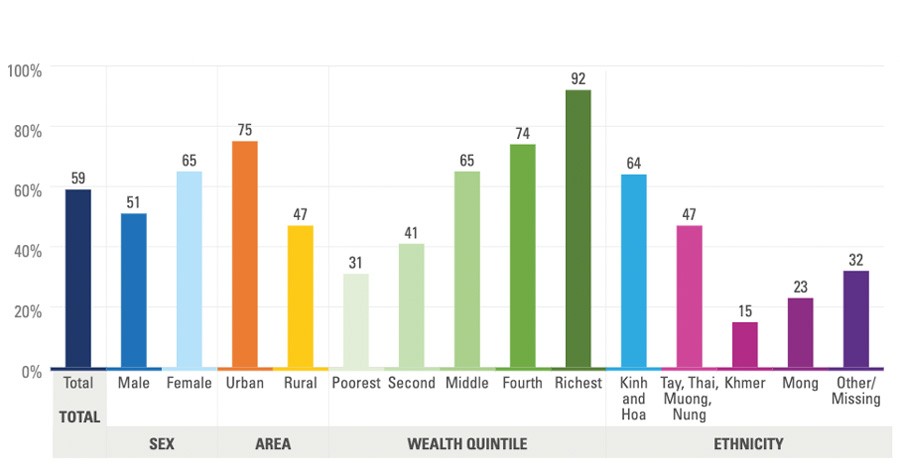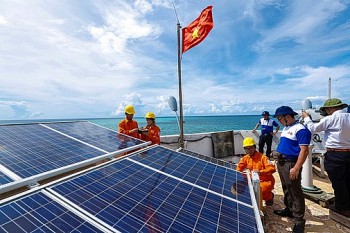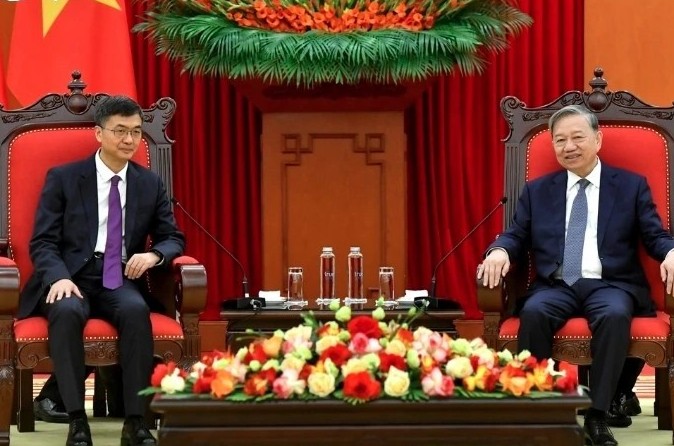ICEF: Vietnam Remains A Key Growth Market In Southeast Asia
The drive among Vietnamese families to send their children abroad remains very strong in 2023. Vietnamese parents have always been drawn to English-speaking study-abroad destinations because of the edge English proficiency provides their children interviewing for jobs. However, as Western hegemony weakens and more global economic power has shifted to the East, Vietnamese students are widening the range of destinations they consider for studying abroad.
 |
| About 59% of Vietnamese youth complete upper secondary schooling but this rises to 92% for the richest households and falls to 31% for the poorest ones. Under half of the Vietnamese children in rural areas complete upper secondary education. Source: UNICEF (2021) |
The latest UNESCO data indicates that 132,560 Vietnamese students were enrolled in higher education abroad in 2020. But Vietnamese students contribute to many other sectors, including K-12, non-degree, and language learning.
The Vietnamese Ministry of Education and Training (MoET) says there were about 190,000 Vietnamese students studying abroad in the 2019/20 academic year, while other sources estimate more than 200,000 abroad.
Education is a top-of-mind concern for families across Vietnam. In 2018, HSBC determined that spending on education accounted for 47% of the total household expenditure in the country. Vietnam’s English-language daily, Vietnam News, puts the national preoccupation with education this way: “Vietnamese families have maintained an age-old tradition of scrimping on everything else except education.”
But Vietnamese families have long lamented the state of their education system, and it’s been said that the poorer a Vietnamese family is, the more determined they are to send their children abroad.
Teacher shortages are a serious problem in many cities and regions and families in rural areas are frustrated by limited access to quality education. As the following chart from UNICEF shows, upper secondary completion rates vary dramatically according to region and income bracket.
Demand for English-language learning is as high as ever
Vietnam is ranked 60 out of 111 countries in terms of English proficiency, according to EF Education First. Last year, the Vietnamese government made English a compulsory school subject for students in Grades 3-12, and has mandated that “all high schools, colleges, and universities in Vietnam must have at least one foreign language and global integration club by 2030.”
 |
| Photo: Sace College Vietnam |
But Vietnamese families aren’t waiting for their education system to catch up with the demand for English among employers, and ELT programs abroad remain as popular as ever.
In 2023, both poorer and wealthier Vietnamese families are upset about rising tuition costs in their country – costs that make studying abroad an even more attractive option. The government announced an intention to raise tuition fees in 2022/23 “to respond to the aspiration for better teaching and learning quality,” but also noted that the effect of COVID on families’ wealth had prompted “many localities have to keep, or even waive, their tuition fees at the general education level for the 2022–23 school year.”
The E-learning market potential is huge
Vietnam is among the top 10 fastest-growing markets for e-learning (20% from 2019–2023), and the market was valued at US$3 billion in 2021, up from US$2 billion in 2019. InCorp Vietnam reports that “Vietnam is host to 200 EdTech startups and is also among the top five countries receiving foreign investments in educational technology.”
According to Nguyen Thanh Nam, founder of FPT Online University (FUNiX), “Vietnam and some other countries like India, the Philippines, and Mexico, which face major population pressure, have had to opt for e-learning to keep up with the education levels in developed countries.”
Demand for English-language learning is as high as ever
 |
| Photo: Ithaca College - Terra Dotta |
Vietnam is ranked 60 out of 111 countries in terms of English proficiency, according to EF Education First. Last year, the Vietnamese government made English a compulsory school subject for students in Grades 3-12, and has mandated that “all high schools, colleges, and universities in Vietnam must have at least one foreign language and global integration club by 2030.”
But Vietnamese families aren’t waiting for their education system to catch up with the demand for English among employers, and ELT programs abroad remain as popular as ever.
 | UK Helps Boost Asia' Clean and Sustainable Economic Growth with US $15 Million Commitment British International Investment (BII), the UK’s development finance institution and impact investor, announced a US $15 million commitment towards building the investment capital needed to ... |
 | Vietnam Posts Trade Surplus of US$9.8 Billion in Five Months The General Statistics Office (GSO) on May 29 announced that the total import and export turnover of goods in May 2023 was estimated at US$55.86 ... |
 | Vietnam Ranked Among 21 Richest Countries In Asia: Insider Monkey Recently, Insider Monkey, a finance website, has compiled a list of the 21 richest countries in Asia, which includes Vietnam. |
Recommended
 National
National
Shangri-La Dialogue 22: Vietnam Highlights Some Issues of Ensuring Stability in a Competitive World
 National
National
Vietnam News Today (Jun. 3): PM Pham Minh Chinh to Attend UN Ocean Conference, Visit Estonia, Sweden
 National
National
Vietnam News Today (Jun. 2): Vietnamese Trade Mission Sounds Out Business Opportunities in United States
 National
National
Vietnam News Today (Jun. 1): Vietnamese, Japanese Firms Foster Partnership
 National
National
Vietnam News Today (May 31): Vietnam Strongly Supports Laos’s National Development
 National
National
Vietnam News Today (May 30): Vietnam, Venezuela Reinforce Ties Through People-to-people Diplomacy
 National
National
Vietnam News Today (May 29): Vietnam and Hungary to Expand Cooperation into New Areas
 National
National


